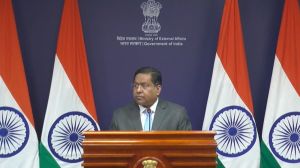Misled by multiple choices
Social scientist Charles Murray has a knack for noisily tapping into cultural preoccupations. In his 1984 book, Losing Ground,

Social scientist Charles Murray has a knack for noisily tapping into cultural preoccupations. In his 1984 book, Losing Ground, he argued that welfare perpetuated dependency and should be eliminated. In The Bell Curve 1994, which he wrote with Richard J. Herrnstein, he argued that those who get ahead in America whites are genetically endowed with more intelligence than those who do not disproportionately African-Americans.
Now Murray is at it again, proposing in a recent article to abolish the SAT. This position cannot help but provoke a double-take. After all, while making his arguments about genes, race and intelligence, Murray promoted the IQ test as a reliable measure of aptitude. Yet he is suggesting that one of the most widely used assessment tests be eliminated.
With so many college officials and parents dissatisfied with the SAT, even those who think Murray8217;s other theories are misguided or offensive could find themselves agreeing with him on this issue.
Unlike other critics of the SAT, Murray does not see the test as flawed, nor does he think that the wealthy have an unfair advantage because they can buy expensive coaching. But he recognises that most people do not agree with him and believe the test is rigged to favour the rich. 8220;It is a corrosive symbol of privilege,8221; he said.
And so, he concludes that college admissions offices should reject the SAT and substitute other standardised tests: subject or so-called achievement tests that gauge knowledge in specific disciplines like history or chemistry.
8220;This is really a hot topic,8221; said William R. Fitzsimmons, dean of admissions and financial aid at Harvard University. Fitzsimmons, who is chairman of a commission on testing organised by the National Association for College Admission Counselling, said, 8220;We8217;re going to be talking about these issues8221; when the commission meets next week at the association8217;s annual convention in Austin, Texas.
Fitzsimmons said he sent every panel member a copy of 8220;Abolish the SAT,8221; an article Murray wrote this summer in which he outlined his new idea. The article appeared in The American magazine, published by the conservative American Enterprise Institute, where Murray is a scholar.
His doubts about the exam started after he read a 2001 study and follow-up done at the University of California finding that the combination of high school grades and standardised subject test scores predicted success in college just as well as the SAT.
8220;I read that and said, 8216;This can8217;t be right,8217;8221; said Murray, who has long credited the SAT with revealing his own aptitude in 1961, when he applied to Harvard from an obscure high school in Newton, Iowa. But after further study, he decided the research was right.
Fitzsimmons said subject tests were the best predictor of good grades at Harvard, high school grade point average was second and the SAT was third. Although few colleges ask for subject tests, Harvard requires applicants to take three as well as the SAT, to give students more ways to show their abilities, he said.
The College Board, which administers both the SAT and the subject tests, not surprisingly said both were important. Although many more students take the SAT than the subject tests, Laurence Bunin, the board8217;s vice president of operations, said, 8220;For kids who take both, 30 per cent do differently on them.8221; Black students in this group, he added, more often do a bit better on the SAT than on the subject tests.
Where Murray and some other SAT sceptics may part company is in explaining why students from wealthy, highly educated families are overwhelmingly the high scorers.
Murray said this had nothing to do with being able to afford coaching because short-term test preparation had an insignificant impact on results. Both Fitzsimmons and the College Board agree that research shows that commercial coaching affects scores only marginally. 8220;The urban legends about test preparation hurt the face validity of the test,8221; Fitzsimmons said. 8220;If we do nothing else in this commission except get out that information about test preparation, then it would be worthwhile.8221;
Although coaching would no doubt continue if subject tests replaced the SAT, at least students would be focused on content as much as test-taking strategies, Murray said. There would also be pressure to improve local high school curriculums so that students were prepared, he wrote.
- 01
- 02
- 03
- 04
- 05































